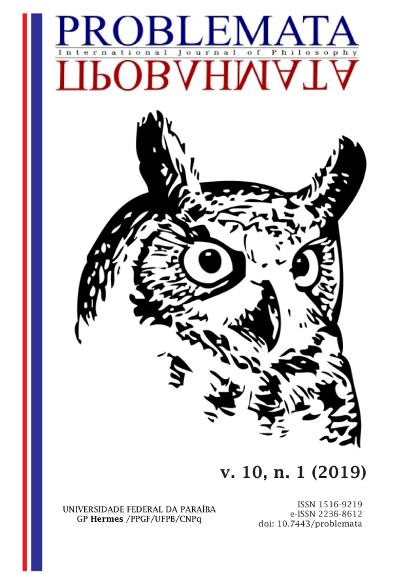CONCEPTION OF PEOPLE IN THE PRINCE OF MACHIAVELLI
DOI:
https://doi.org/10.7443/problemata.v10i1.41855Keywords:
Machiavelli. People. The prince. Political conflict.Abstract
The purpose of this article is to examine the conception of people present in the work The Prince of Machiavelli. We will show that people appear in this work with a double meaning, varying according to the context of their use. On the one hand, in the context of the founding of the great lawmakers and the foundation by a new prince he appears with the meaning of all the subjects. On the other hand, in the context of the prince's relations with his people under an already established political order, people specifically indicate the mood that in every city is opposed to the mood of the great. While in the context of the foundation people are a passive body submitted to the prince, in the context of the government of an already established political order people appear as a politically active and determining force in relation to the prince. The two meanings are in a relationship of tension: in the course of the foundation the prince tends to reduce the people to their condition of totality of subjects, but in the concrete political action the prince needs tenant animato l'universale as humor of the part that, united to the prince, is opposed to the desire to command the great.
Downloads
References
ADVERSE, Helton. Maquiavel: política e retórica. Belo Horizonte: Editora UFMG, 2009.
BONADEO, Alfredo. The role of the people in the works and times of Machiavelli. Bibliothèque d'Humanisme et Renaissance, T. 32, No. 2 (1970), p. 351-377
BORELLI, Gianfranco. Machiavelli, ragion di Stato, polizia cristiana. Napoli: Cronopio, 2017.
FROSINI, Fabio. Una lettura del l’ambiguità del vero e il rischio della virtù. Una lettura del Príncipe. In: DEL LUCCHESE, F. SARTORELLO, L. VISENTIN, S. Machiavelli: immaginazione e contingenza. Pisa: Edizioni ETS, 2006, p. 31-66.
GAILLE-NIKODIMOV, Marie. Machiavel, penseur de l’action politique. In: Lectures de Machiavel. Paris: Ellipses, 2006, p.259-292.
ION, Cristina. Machiavel et les désirs du peuple. In: ZARKA, Ives Charles e ION, Cristina (Orgs.). Machiavel: Le pouvoir et le peuple. Paris: Mimesis, 2015, p.139-155.
LEFORT, Claude. Le Travail de L’Oeuvre: Machiavel. Paris: Gallimard, 1972.
MACHIAVELLI, Niccolò. Discorsi sopra la prima Deca di Tito Livio. A cura di Mario Martelli. Firenze: Sansoni, 1971.
______ Niccolò. Tutte le Opere. A cura di Mario Martelli. Firenze, Sansoni, 1992.
MAQUIAVEL, Nicolau. O Príncipe (edição bilíngue). Tradução e notas de José Antônio Martins. São Paulo: Hedra, 2009.
SKINNER, Quentin. Maquiavel. Tradução de Maria Lucia Montes. São Paulo: Brasiliense, 1988.
SUCHOWLANSKY, Mauricio. Between Citizen & Subject: Placing the People in Machiavelli’s Political Imagination. Disponível em: http://papers.ssrn.com/sol3/papers.cfm?abstract_id=2314496. Acesso em 31/08/2016
VISENTIN, Stefano. La virtù dei molti. Machiavelli e il repubblicanesimo olandese della seconda età del seicento. In: LUCCHESE, Filippo; SARTORELLO, Luca; VISENTIN, Stefano (Orgs.). Machivelli: Immaginazione e contingenza. Pisa: Edizioni ETS, 2006.
______ Stefano. Il luogo del principe. Machiavelli e lo spazio dell’azione política. In: Rinascimento vol. LIII. Firenze: Leo S. Olschki Editore, 2013, p. 57-72.
Downloads
Published
Issue
Section
License
Authors who publish with this journal agree to the following terms:
- Authors retain copyright and grant the journal right of first publication with the work simultaneously licensed under a Creative Commons Attribution License that allows others to share the work with an acknowledgement of the work's authorship and initial publication in this journal.
- Authors are able to enter into separate, additional contractual arrangements for the non-exclusive distribution of the journal's published version of the work (e.g., post it to an institutional repository or publish it in a book), with an acknowledgement of its initial publication in this journal.
-
- Authors are permitted and encouraged to post their work online (e.g., in institutional repositories or on their website) prior to and during the submission process, as it can lead to productive exchanges, as well as earlier and greater citation of published work (See The Effect of Open Access).





